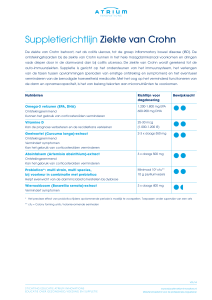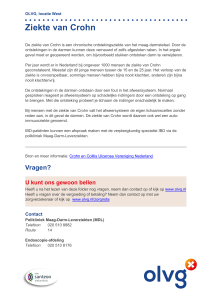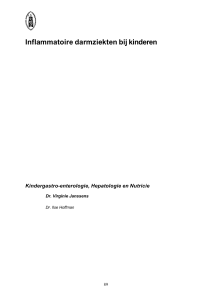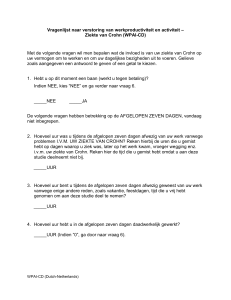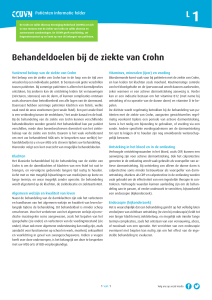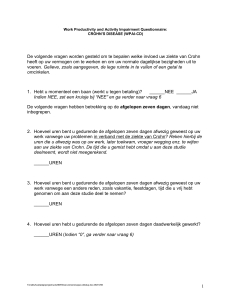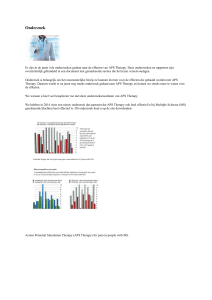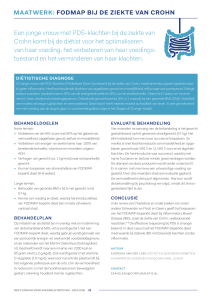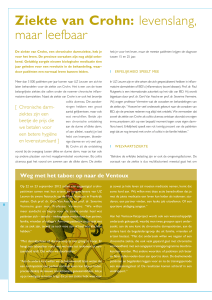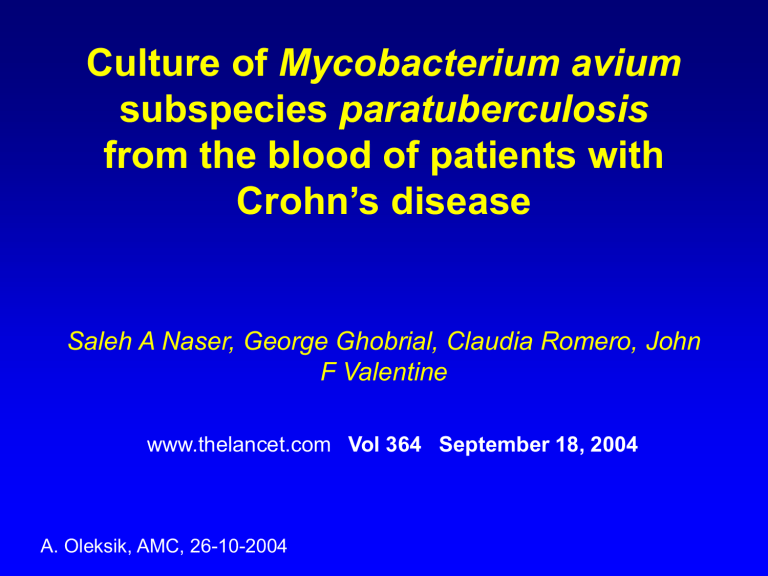
Culture of Mycobacterium avium
subspecies paratuberculosis
from the blood of patients with
Crohn’s disease
Saleh A Naser, George Ghobrial, Claudia Romero, John
F Valentine
www.thelancet.com Vol 364 September 18, 2004
A. Oleksik, AMC, 26-10-2004
Achtergrondinformatie
• De etiologie van de ziekte van Crohn blijft onduidelijk
• CARD15 mutaties in 15-22% van Crohn-gevallen
• Er bestaat een disscussie over de betekenis van
Mycobacterium avium s. paratuberculosis
MAP en Crohn
voor
tegen
•Macroscopie en Histologie
•Clustering (Schotland)
•Expositie (40-60% rund en 720% melk)
•MAP PCR in weefsel (2/3 vs ¼)
•Levensvatbaar MAP in darm,
lnn, moedersmelk en bloed
•Case report: lymphangitis in
hals, daarna Crohn
•Causaal verband niet
aangetoond
•Anecdotisch effect van antituberculose-behandeling
•Cochrane: te kleine getallen
Methoden
• 52 personen (18-77 j; 50% vrouw):
–
–
–
–
28 Crohn (60% v)
9 colitis ulcerosa (20%)
4 andere darmpathologie
11 gezonde personen
• Klinische gegevens:
– Duur van ziekte
– Ziekte-activiteit volgens Harvey-Bradshow
– Gebruik van immunosuppressiva
• Buffy coat van 4 ml bloed
– Extractie van DNA (IS900)
– Kweek
• MGIT (8-12 wk) -> kleuringen + DNA->nested PCR,
• BACTEC tot groei-index boven 50 -> idem
Resultaten
Crohn
N=28
C.ulcerosa
N=9
Controle
N=15
Totaal
N=52
Vrouw
61%
22%
47%
50%
Immunosuppressiva
62%
44%
-
DNA
Buffy c.
46%
(n=13)
44%
(n=4)
20%
(n=2)
38%
Kweek
50%
(n=14)
20%
(11) (n=2)
0%
16 pat
0
11 pat
(9 strains)
DNA uit
kweek
(n=10)
(n=1)
(1)
Discussie
• Bevindingen:
– MAP in bloed
– MAP en IBD
= systemische ziekte (Johne’s)
= actieve infectie / colonisatie
= gezamelijke triggers?
– Geen MAP in controles = verschil in eliminatie?
– PCR+ in controles = expositie
• Zwakke punten:
– Geen associatie met immunosuppressie = type 2 error?
– Echter nooit reactivatie van MAP onder
immunosuppressie
• Sterke punten
– Bevestigen MAP door IS900
– Bewezen van heterogeniciteit van de MAP-stammen
– Controle voor contaminatie
Conclusie
• Geen bewijs voor een causaal verband
• Noodzaak voor grotere studies (cohort)
• Bloedkweken ter bepaling van de behandelingsindicatie?
Toekomstperspectief (comment by Warwick S Selby)
• “The Australian randomised, placebo-controlled trial of 2
years’ treatment with clarithromycin, rifabutin, and
clofazimine in Crohn’s disease has just been completed.
The results are being analysed and are eagerly awaited”.
Wat zegt de Cochrane-review?
• A total of seven randomized trials = 355 patients:
OR for maintenance of remission = 1.36 (95% CI 0.87-2.13)
• The two trials reported as abstracts were excluded from subgroup analyses
because they did not include any information on adjunct therapy.
•
Two trials (only 89 patients) used anti-tuberculous therapy
(clofazimine or clofazimine, rafmpin, ethambutol, and dapsone) in
combination with corticosteroids to induce remission. Maintenance
therapy consisted of the anti-tuberculous agents without
corticosteroids. Control patients received corticosteroids to induce
remission but no anti-tuberculous therapy.
OR for maintenance of remission of 3.37 (95% CI 1.38-8.24). The
number needed to treat was three.
• The remaining three trials compared the combination of antituberculous therapy and 'standard therapy' with 'standard therapy
alone'. The pooled odds ratio was 0.70 (95% CI 0.39-1.25).
Hoe zit het met CARD15 – TLR2?
• CARD 15
–
–
–
–
Intracellular receptor
Reageert op peptidoglycan “muranyl peptide” = MDP
Stimuleert NFκB = inflammatie
Maar remt TRL 2
• TLR 2
–
–
–
–
–
Transmembrane receptor
Activatie in phagosom
Reageert op peptidoglycanen (G+ bacterieen)
Stimuleert phagocytose en fusie van phagosom met lysosom
Is dus noodzakelijk voor CD4+ activatie en selectie (Th1, Th2)
• B7-CD28
• Ag/HLA II - TCR
– Stimuleert NFκB = inflammatie
• Mycobacterium
– Ontwijkt de fusie van phagosom met lysosom

